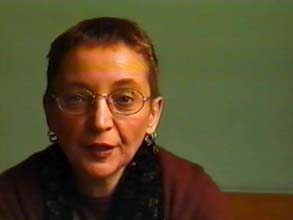Representation of the political situation in the Middle East and how this relates to the West is an important theme in Jayce Salloum's work. Research into cultural/political manifestations, ethnographic representation and the methodology behind this, forms the basis for the (video)installations, publications and readings that Salloum has produced in the last eight years. The artist works at the edge of documentary or even (political) journalism. With his work, he attempts to directly influence developments in the question of war (in the Middle East). The showing of his video 'Up to the South' (1994) in Paris in 1995 contributed to the release of Soha Beschara, writer and member of the Lebanese National Resistance, from the El Khiam prison camp in occupied South Lebanon in September 1999. Beschara is a national heroine in Lebanon. Photos of her decorate the living rooms of many families in southern Lebanon. In the nineties, her portrait was hung, poster fashion, in the streets of Beirut. She withstood ten years imprisonment in El Khiam, six of which she spent in complete isolation in a very small cell. Recordings of Beschara are an important part of 'Beauty and the East'. Salloum interviewed her in her tiny apartment in Paris. She voices her thoughts about revising notions of resistance, survival and will without noticeable emotion. She is silent about the torture she had to endure. Instead, she talks about the distance between the subject and the loss, about what is left behind and what remains. As well as Soha Beschara, Salloum interviewed a large number of people who play an important role in the discussion about, and adding significance to, the political situation in the Middle East. The long list of names, including Boris Buden (theoretician and editor 'Arkzin', Zagreb and 'Bastard', Vienna), Dunja Blazevic (Director of the Centre for Contemporary Art in Sarajevo, Bosnia Herzegovina), Mihaljo Acimovic (Yugoslavian activist, in exile in Vienna) and Emir Salihovic (journalist, writer, Sarajevo), consists of writers, theoreticians, activists, artists, anthropologists, architects, academics, musicians and human rights workers. In addition to the interviews with these people, Salloum travelled to immigration areas to make recordings of people who were about to leave their home countries. He wanted to portray the threat of disappearance, of being forced to live in a transit area in inter-cultural circumstances. What does nationalism still mean then? An important question that remains central is: what kind of freedom insures that people stay where they are and what sort of force drives people away? The extensive research that Salloum has done in order to get an insight into this question does not lead in this instance to a documentary, somewhat detached form. 'Beauty and the East' is a poetic, personal account in which feelings, (hidden) emotions and stories play a governing role. The experience of the uprooted, being swept away from a familiar situation, is shown in a subdued manner. Now and then, the scraps of conversation fade into the background (literally) when a projection sweeps across with images of a landscape, abandoned areas that imprint themselves like ghosts in the minds of the people.
– Nathalie Zonnenberg
|
With: Soha Beschara, Mihaljo Acimovic, Emir Salihovic, Boris Buden, Marina Grzinic, Zarana Papic, Eda Cufer, Dunja Blazevic, Ella Shohat, Ammiel Alcalay e.a.
Jayce Salloum, 1958, Kelowna (Canada)
Lives and works in Vancouver (Canada)
|
|
